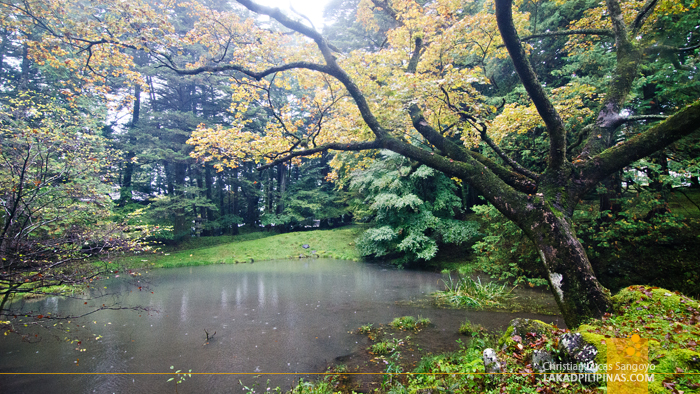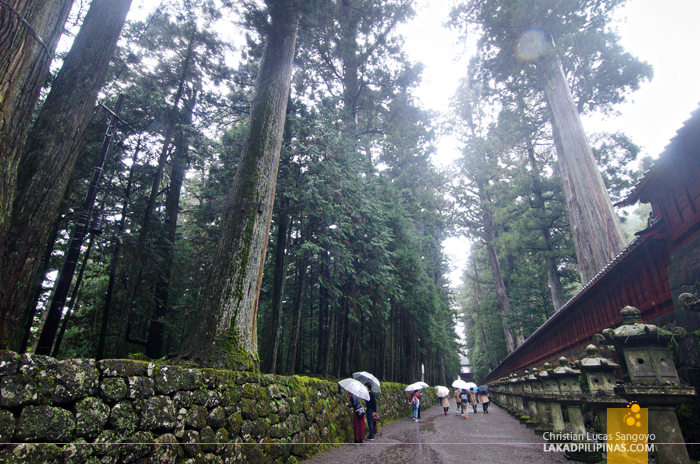JAPAN | Autumn Rains, a Nikko Temple Run
Thursday, December 14, 2017
Without umbrellas, we braved the incessant rains and visited the olden temples of Nikko. It was pouring harder than the previous days and it was incredibly hard to go from one place to the next. The scenery, century-old temples on backdrops of pre-autumn foliage was nothing short of poetic. But taking photographs was out of the question as our lenses quickly filled with droplets the moment we train them on anything. One thing was for sure, we needed umbrellas!
 |
| USING THE NIKKO TRAVEL PASS |
As with our one day Hakone Free Pass Tour, we booked our Nikko Travel Pass from Klook right after booking our cheap flight from Manila to Tokyo via Cebu Pacific. We got it the same day we booked our previous tour via the easy-to-use app on our phone—easy breezy. The pass can be used for two to four days in Nikko and Kinugawa—including transfers from Tokyo and back—and it is unlimited. As a bonus, you can also utilize it for discounts on selected tourism facilities and souvenirs shops in Nikko, Kinugawa, and even Asakusa!
 |
| RAINY AUTUMN DAY IN NIKKO |
And as always the case with us, we only have limited time so instead of traveling slow and taking in all of Nikko’s old Japan vibe, we only got to visit for a day. Such a shame, I know, but what can we do?
 |
| VISITING NIKKO FOR THE TEMPLES |
Nikko is located in the Tochigi Prefecture, about two hours away from Tokyo and it boasts of historical temples and structures stamped as National Treasures of Japan, Important Cultural Properties, and most importantly, UNESCO World Heritage Sites.
 |
| TAKING THE TOBU LINE TO NIKKO |
To get there, we redeemed our Klook vouchers at the Tobu Asakusa Station which was just a few minutes away from Wired Hotel Asakusa where we were staying, then used that to ride the Tobu line to the Shimo-imaichi Station. It was raining cats in dogs in Tokyo, the situation in Nikko was worst. A two-stop bus ride later and we were scrambling up through wet stone steps leading up to the temples.
 |
| WE FORGOT TO BRING OUR UMBRELLAS |
We passed throngs of tourists, each one holding an umbrella, unlike us. We were extremely wet by the time we reached Rinnoji, Nikko’s most important temple. We thought it was a warehouse of sort, being covered in sheets painted with an image of a temple, before realizing that there’s actually a huge temple inside it. It turns out it’s being renovated until March next year. The temple was founded by Shodo Shonin, an 8th-century Buddhist monk who introduced the religion to Nikko.
 |
| THE GOJUNOTO PAGODA IN NIKKO |
Following the bob of umbrellas, we were led to the Gojunoto Pagoda, a graceful five-storey structure built in 1818. Each of its five levels represents an element—earth, fire, water, wind, and ether or void.
 |
| BEHIND THIS WALL IS THE NIKKO TOSHO-GU SHRINE |
It stands perpendicular to the Nikko Tosho-gu Shrine, the main draw of the Nikko temple tour. The shrine, part of the UNESCO World Heritage Site, is dedicated to Tokugawa Ieyasu, the founder of the Tokugawa Shogunate which reigned over Japan for over 250 years until 1868. The temple was built in 1617 and houses the actual remains of Ieyasu.
 |
| LOOKING FOR UMBRELLAS AT NIKKO |
There is an entrance fee to enter the temple, and while JPY1,300.00 (USD11.55 | PHP581.50) is reasonable enough to access a UNESCO Site, the line of tourists leading up to the gate changed our minds. So, instead, we headed towards a gravel path lined with towering cedar trees and Japanese toro stone lanterns.
 |
| THE TREE-LINED PATH TO FUTARASAN SHRINE |
The scenic path leads to a copper torii, built in 1799, marking the entrance to the Futarasan Shrine. Founded in 782, it is one of the older shrines this side of Japan. Surprisingly, it isn’t dedicated to gods, but to mountains, three to be exact—Mount Nantai, Mount Nyoho, and Mount Taro—the sacred mountains of Nikko. And it was here, finally, where we found ourselves some umbrellas!
 |
| A GRACEFUL COPPER TORII BUILT IN 1799 |
The temples are free to enter except for a small area near the back where you can find a garden forest, some halls, and a gurgling spring surrounded old sacred trees. We took a bit of time in this place, unmindful of the rain, since patches of autumn were already showing on the surrounding trees.
 |
| FUTARASAN PRAYER HALL |
 |
| MOST OF THE AREAS IN FUTARASAN SHRINE CAN BE ACCESSED FOR FREE |
Going back down the road, we missed the Iemitsu Mausoleum—the resting place of Iemitsu, Ieyasu’s grandson and the third Tokugawa shogun. It resembles the Toshogu Shrine in both layout and architecture, but on a lesser scale, a gesture made out of respect for his grandfather.
 |
| ON A PARKING LOT SOMEWHERE IN THE TEMPLE COMPLEX |
Back on the road, we deliberated whether to take the bus going back to the train station or simply walk, but since there wasn’t any passing bus at the moment, we decided to walk. It led us to a convenience store, which we badly needed since we didn’t have lunch yet and it was almost three in the afternoon.
 |
| THE SHINKYO SACRED BRIDGE |
After bowls of ramen curry and what-nots, we resumed our walk and passed through the Shinkyo Sacred Bridge. The vermilion lacquered bridge is a part of the Futarasan Shrine and was built in 1904. It crosses the raging Daiya River below with a graceful arch and is considered as one of the three most beautiful bridges in the whole of Japan. It was just too bad that it was closed to the public at the time.
 |
| ONE OF THE THREE MOST BEAUTIFUL BRIDGES IN JAPAN |
It was already late afternoon when we boarded the bus that would drop us at the Shimo-imaichi Station. The rain was getting worse. But once we arrived at the station that would herd us back to Tokyo, the rain fully stopped. Nice.
► KLOOK & CEBU PACIFIC AIR MADE THIS TRIP POSSIBLE. VIEWS & OPINIONS ALL MINE.
► FLY TO TOKYO VIA CEBU PACIFIC FOR AS LOW AS PHP6,000++ ROUNDTRIP
► BOOK ONLINE FOR DISCOUNTED TOURS IN TOKYO

Nikko Travel Pass Tour
Ticket Pick Up Location: TOBU Sightseeing Service Center,
1st Floor, Central Exit, Tobu Asakusa Station
Opening hours: 7:20AM - 7:00PM
Klook Voucher Rates: 2-Day Pass - PHP1,213.00 | 4-Day Pass - PHP2,055.00 


























































0 comments